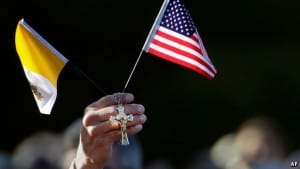
Catholicism and American conservatives: Trump’s papal problem reopens some old fault lines
 IN MEDIEVAL England, quarreling with the pope was a game with high stakes for anyone who wanted to wield earthly power. King John (1199-1216) was punished with a papal interdict, suspending all religious services in his realm, and then excommunicated; he finally yielded to the pope’s will and to make amends his successors had to pay tribute to the Vatican for another 150 years. John is remembered as a terrible king; but 300 years later, when Henry VIII defied papal authority over his marital status, he earned a place as one of England’s national heroes.
IN MEDIEVAL England, quarreling with the pope was a game with high stakes for anyone who wanted to wield earthly power. King John (1199-1216) was punished with a papal interdict, suspending all religious services in his realm, and then excommunicated; he finally yielded to the pope’s will and to make amends his successors had to pay tribute to the Vatican for another 150 years. John is remembered as a terrible king; but 300 years later, when Henry VIII defied papal authority over his marital status, he earned a place as one of England’s national heroes.
Whatever his political destiny, Donald Trump is unlikely to pay as high a price as bad King John for incurring the disapproval of the bishop of Rome. But at the very least, the public spat between the billionaire Republican presidential candidate and Pope Francis has rather painfully re-exposed some old fissures in the world of religious conservatism.
Here is what Pope Francis said (in Italian), when asked by a reporter on the papal airliner returning from Mexico, about how voters should respond to Mr Trump and his proposal to expel illegal immigrants and fortify America’s southern border.
A person who thinks only about building walls, wherever they may be, and not of building bridges, is not Christian. This is not the gospel. As far as what you said about whether I would advise [people] to vote or not to vote, I am not going to get involved in that. I say only that this man is not Christian if he has said things like that. We must see if he said things that way, and I will give him the benefit of the doubt.
«For a religious leader to question a person’s faith is disgraceful. I am proud to be a Christian and as president I will not allow Christianity to be consistently attacked and weakened, unlike what is happening now,» Mr Trump retorted in a Facebook post. He added that he was more likely than any other contender for earthly office to protect the Vatican from the terrorists of Islamic State. But hours later, at a meeting in South Carolina, he struck a more emollient note saying he had a «lot of respect» for a pontiff who had «a lot of personality» and was «doing a very good job.»
Even in the Bible Belt, where theological objections to the Vatican remain pretty robust, and some zealous Protestants would still call the pope the «anti-Christ», it is probably not a particularly good idea for any conservative candidate to wage a feud with the Vatican.
Such a tactic would amount to tearing up the truce between evangelicals and Catholics that has been a feature of the American landscape at least since 1994, when prominent figures in both camps acknowledged each other as Christians (which they barely did before) and promised to make common cause against ills ranging from abortion to pornography. That relationship was consolidated with the Manhattan Declaration of 2009, in which traditional Catholics and Protestants vowed to work together for the traditional family and against gay marriage.
Among the signatories was Albert Mohler, the president of Southern Baptist Theological Seminary and one of America’s most influential evangelicals; although he had described Catholicism as a «false church«, he explained that alliances were needed in face of mounting threats to «the sanctity of human life, the integrity of marriage and religious liberty.»
But the alliance is still a fragile one and there have been some signs of shakiness. Mr Mohler, for example, has denounced Pope Francis for moving the Catholic church to the left and failing, during his address to Congress last autumn, to denounce abortion and gay marriage with the necessary zeal.
And even before the current papacy, the American right and the papacy were never a perfect fit. John Paul II may be a conservative hero because of his opposition to communism; but in the twilight of his reign, the papacy strongly opposed America’s assault on Saddam Hussein, not least because it would be disaster for Middle Eastern Christians. Pope Benedict XVI was admired for his traditional ideas on moral issues; but on his watch the Vatican made some quite radical pronouncements on global economics. And under any pope, the American Catholic church is a natural supporter of liberal immigration policies; Latino newcomers are revitalising an institution that would otherwise be in the doldrums.
If Mr Trump were to wage a long-running verbal battle with the Vatican, that might please evangelical voters who are already muttering things like «…never did quite trust those Catholics». But he would also be letting down the broader «theocon» cause and its self-imposed mission to work together against the demons of secularism and liberalism. The second consideration probably weighs heavier than the first.
